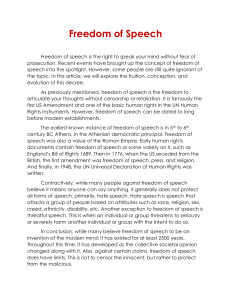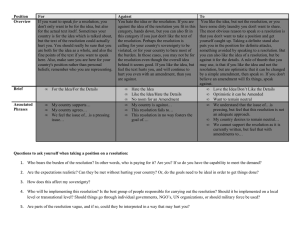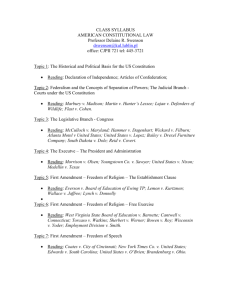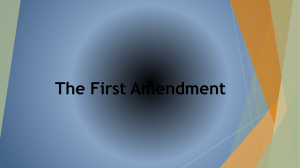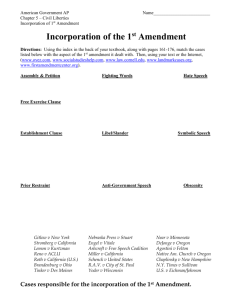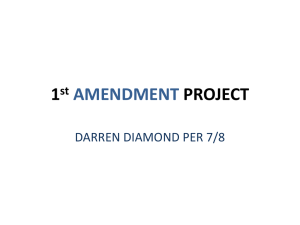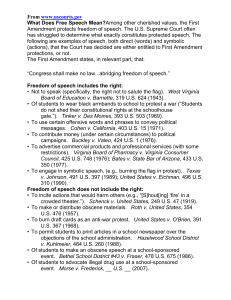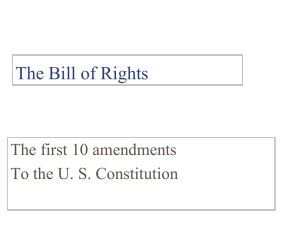Freedom of Expression - Currituck County Schools
advertisement
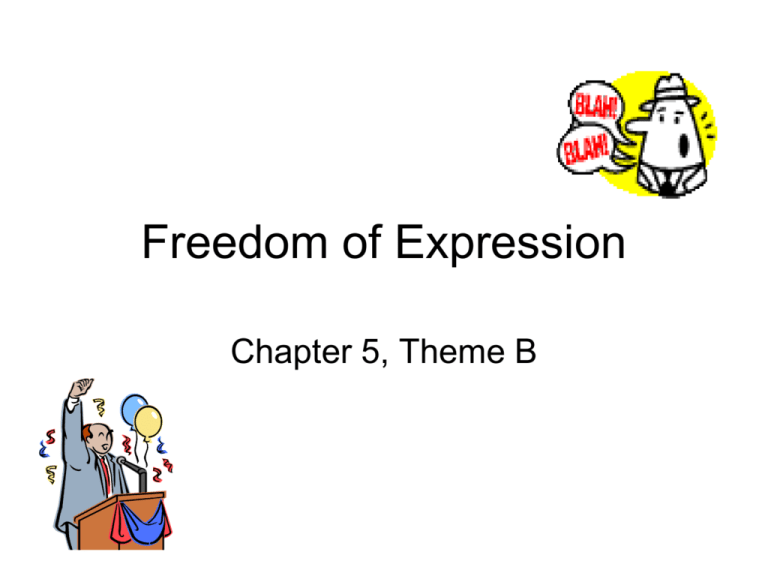
Freedom of Expression Chapter 5, Theme B Why is the 14th Amendment important to the Freedom of Expression? • Starting in 1925 (Gitlow v. NY), the SCOTUS has applied all 4 forms of expression in the 1st Amendment to the states using the Due Process Clause of the 14th Amendment. • The Due Process Clause has expanded the civil liberties of all Americans at the federal, state and local levels. NO level may deny life, LIBERTY, or property without due process! Expression • What are types of protected Expression? Discuss History and examples of each: – Pure Speech – Peaceful Assembly – Symbolic Speech – Press – Petition for Redress – Protests – Commercial Speech – Unpopular views/dissent • How should expression be interpreted? – Discuss approaches: • Absolutist, Categorical, Balancing Approaches Case examples of interpretation For each case, tell which view is being espoused by the SCOTUS: • Brandenburg v. Ohio (1969): Imminent lawless action doctrine • Near v. Minnesota (1931): Incorporated limits on prior restraint to states • Chaplinsky v. New Hampshire (1942): Fighting words not protected as free speech • Tinker v. Des Moines(1969): Students don’t shed rights at school • Hazelwood v. Kuhlmeier (1988): Schools are foremost educators Why is Free Expression Important to Democracy? • Read Values. • Which is most important and fundamental? • What costs come with truly free expression? • When, if ever, should expression be limited? Which value does that hurt the most? Other Expression Interpretations • Preferred position doctrine – Meaning? – Examples? • Limits on time, manner, and place – Meaning? – Examples? • Limits on assembly – Permits • Limits on the Press – Libel • Limits on petition – Threats What kinds of expressions are not protected by the 1st Amendment? • • • • • • • • Obscenity (Discuss quote in book) Seditious Speech: Fighting Words (Chaplinsky v. NH) Non-political symbolic speech (Wearing a Snoopy t-shirt is not protected) Disruptive, non-political student speech (Bethel v. Frasier, Morse v. Frederick) Blatant threats (Rise of social media cases) Obstruction of justice Slander & libel Why should hate & unpopular speech be tolerated? Outline history of cases: Hate speech/assembly • Skokie, Illinois cases Confederate flag as hate symbol • Virginia v. Black (See video?) Flag Burning as a form of protest • Texas v. Johnson Assembly & protest on public property • Snyder v. Phelps http://www.pbs.org/wnet/religionandethics/episodes/ october-8-2010/snyder-v-phelps/7180/ What’s due when… • Read pp. 113-117 & handouts. Complete cases study. Take notes on vocabulary, cases & interpretations. • Due Tuesday! • Movies will be shown tomorrow! Be prepared to give our audience a brief intro to your video. It would be appropriate to thank anyone who is not in the class for their help with the video.
